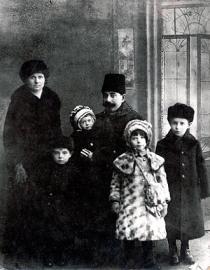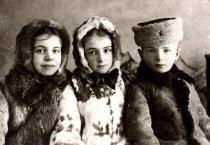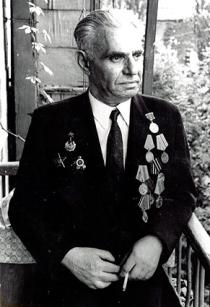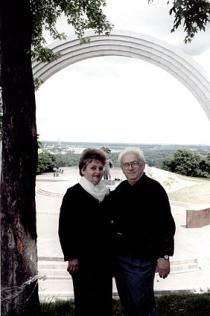My father Isaac Stel'makh in jail in Berlin on 21 January 1949. This is a photograph from his criminal files that my father took with him to Kiev after he was released from a Soviet concentration camp and amnesty in 1956.
In 1941 my father went to the front. I 1945 he reached Berlin. After the victory he was assigned to the Soviet Military Administration of the town. In 1947 he came to take us to Berlin. We were taken to a wonderful apartment of 8 rooms. I don’t know what position my father had, but we had a nice life.
On 20 January 1949 state security officers came to my father's office and asked him to follow them. He didn't understand at once what it was about. Only when they asked him to take off his tie and untie and remove his shoe laces, he understood that he was arrested. He was accused by article 58, item 10: anti-Soviet agitation and propaganda. He was taken to Spandau, a prison in Berlin. For ten months my father underwent tortures during interrogations. They tried to force him to write evidence against himself that he called to overthrow the existing regime and Stalin. My father didn't succumb. They tried all methods of NKVD: torture with hunger, when an investigation officer was eating cutlets with fried potatoes before my father who hadn't eaten for several days, night interrogation, when they didn't allow a person to fall asleep and woke him up the moment he fell asleep. Besides, my father, an inveterate smoker, suffered without cigarettes, and an interrogation officer smoked good cigarettes in front of him. In November 1949 the investigation officer said that if my father didn't sign his confession, he was to be 'acted' on the following day (in the NKVD language it meant that a person was killed and an 'act for death from a heart attack' was issued). My father was thinking all night through. He decided to sign the confession or he would die. He thought of saying that he was forced to do this in court. My father still believed that this was misinterpretation of the party policy and that the just Soviet court would know what was right. The interrogation officer said this was quite another matter. He gave my father a cigarette and somebody brought him food. Next day the investigation officer read to him that by decision of the special meeting he was sentenced to 10 years in jail.
In December 1949 my father was deported to the Soviet Union. There was a train full of such prisoners betrayed by the soviet power. They were ordered to put on worn German overcoats and caps so that people didn't know that they were Soviet clerks and military. People were spitting on their side thinking that they were fascist prisoners. They arrived in Komi ASSR, Kayskiy district, about 6000 km from Kiev. There were political and criminal prisoners in the camp. Criminal prisoners humiliated them and kept them in fear. They beat them losing a card game. My father worked at a wood cutting facility at first. It was hard for him, but he did his workload. He was a man of strong spirit and he managed to gain respect of political and criminal prisoners. Nobody ever humiliated him. In 1951 other prisoners proposed to make my father director of the bakery shop. This was a prestigious position in the camp where bread was a major product. 'My father performed his duties excellently and repaired the building of the bakery. He kept it in ideal order.
After Stalin's death those prisoners who were innocent victims of his regime began to return home. In September 1954 my father was released. He was not rehabilitated, though, but, as his certificate of release indicated, his sentence was reduced from 10 to six years, and he was released before term for good performance and behavior. On 14 August 1956 the Military Collegium of the supreme Court of the USSR reviewed the case of Isaac Stel'makh and closed it for absence of corpus delicti. My father was rehabilitated.










